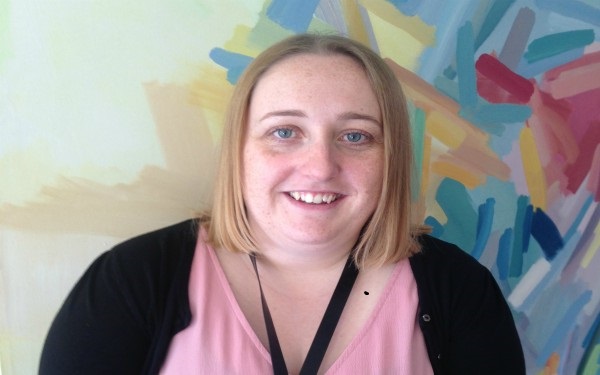I joined Lincolnshire County Council in September 2017, and came in as a practice supervisor from another authority. I knew I always wanted to work for Lincolnshire, ever since taking up a role here while studying to become a social worker.

Laura Bonner is a FAST team manager in Lincolnshire County Council
Lincolnshire has a very good career pathway, and I try to take up all the opportunities afforded to me, so I studied for a post-qualifying certificate in leadership and management through the South Yorkshire Teaching Partnership at Sheffield University. It was during that course that I applied for the team manager role, and I took up the post in September 2018. I absolutely love my job and working for Lincolnshire.
I always knew I wanted to become a team manager, because I wanted to have a wider impact on service delivery for children and young people. I feel that by sharing my knowledge and expertise across my practice supervisor group and the rest of my social work team, I’m having that positive impact. The family assessment and support team (FAST) is a very challenging area to work in, but I love being a part of that, because I’m advocating on behalf of children and young people who don’t always have a voice.
Apprenticeship scheme
In Lincolnshire County Council, we have our first cohort completing the social work apprenticeship scheme, where unqualified workers who have worked within the council, with the early help service for example, are taking the employment-based training route to become qualified social workers.
For any social work student in the team or on placement, they are supported to develop their social work knowledge and we provide them with extensive shadowing opportunities across a range of teams in children’s services. This all contributes to the overall progress of the student completing the social work degree and provides insight into the various and varied social work roles within Lincolnshire County Council.
Teamwork
It’s never just one person that contributes to the development of new staff in Lincolnshire. We all play a part – exposing them to a range of expertise while they’re training means they have all the skills they need for excellent practice. Newly qualified workers on the assessed and supported year in employment (ASYE) also have a group supervision run by the learning and development team, which provides them with extra support alongside their practice supervisor and wider team members. Lincolnshire County Council is a really supportive place to work.
Covid-19 brought a challenge to the whole world early in 2020 and this meant adapting the way we work in a challenging time while equally maintaining the expected practice standards and safeguarding children. Lincolnshire County Council rose to this challenge and adapted how we work embracing technology to support our work and interactions with children and families whilst also continuing to complete face to face interactions for those children and families that needed this.
Reflection
As part of my role as a team manager, social workers and their practice supervisors will often speak to me throughout the day to discuss cases, and I take on the role of being a bit like a critical friend – an outsider looking in – to check there are no gaps in what we’re doing and we’re achieving the best safeguarding outcomes for children.
I was attracted to Lincolnshire partially because of the clear career pathway, but also because it’s maintained good inspections with Ofsted throughout my social work career. Lincolnshire is a learning authority, and we’re always keen to embrace new changes in practice, whether it’s through legislation or the models that we use. The change culture comes very much from the top down – senior management lead by example here. Senior Management are visible and present leaders in Lincolnshire and this has continued throughout the pandemic, including at individual team levels This was positively received by staff and this is something that continues in the teams to promote team development whilst working in a more virtual world.
“It’s about showing our staff that we’re human, being able to have honest and frank conversations”
Practice model
In early 2019, we completed a pilot for our at the time newly redesigned child and family assessment, to try to bring it more in line with the Signs of Safety framework. I was part of role modelling and delivering that new assessment out across the service, specifically making sure that my team were ready with the new model when we went live in 2019. This is now a well embedded assessment within Lincolnshire County Council children’s services and has been highly commended by partners in practice.
Authorities that use Signs of Safety definitely notice a positive impact on the interactions with families, as it uses plain language to help engage families and enables them to take more ownership of their own care plans.
How we role model what we do as leaders and managers in terms of work-life balance matters. It’s about showing our staff that we’re human, being able to have honest and frank conversations, creating that safe space in the office and supporting workers when they might be feeling a bit more tired or they’ve got a lot of commitments coming up. We are always looking at the peer support within the team and encourage them to take time off.
There are stresses at every level – just because managers become non-case-holding, it doesn’t mean that the stress of social work disappears – and everybody needs their own coping mechanisms. I like to stay positive, have a laugh, and make sure I appropriately use my annual leave. That’s something people entering social work need to remember: you need to make sure you book time in for looking after yourself. Plan your annual leave so that you have regular breaks. Social work is predicable in being unpredictable.



 Facebook
Facebook X
X LinkedIn
LinkedIn Instagram
Instagram
Comments are closed.